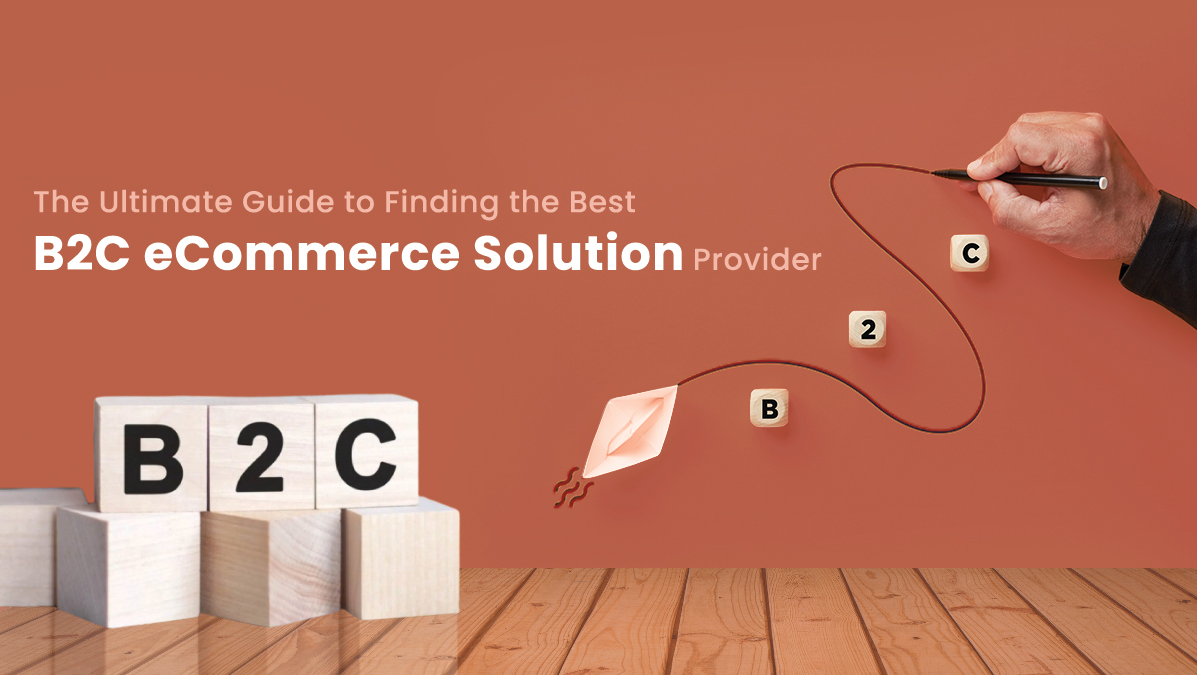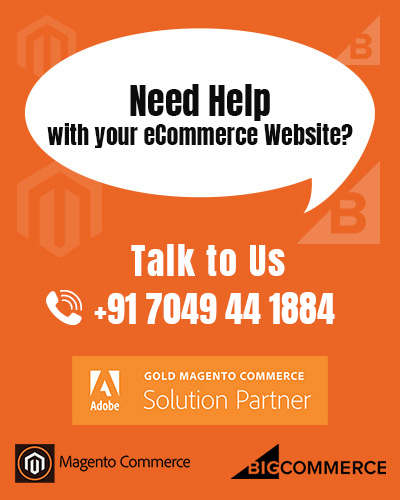Establishing a robust online presence is no longer just an option – it’s a necessity for modern-day businesses. For B2C (business-to-consumer) enterprises, eCommerce has emerged as a pivotal channel for growth and customer engagement. However, the process of developing and maintaining an effective eCommerce platform demands specialized skills and resources that may be beyond the capabilities of an in-house team. This is where partnering with a proficient B2C eCommerce solution provider comes into play.
In this comprehensive guide, look into the essential considerations when embarking on the quest for the best B2C eCommerce solution provider.
Let’s start by throwing some light into-
B2C eCommerce: An Overview
B2C eCommerce, or Business-to-Consumer eCommerce, refers to the online transactions and interactions that occur between businesses and individual consumers. In simpler terms, it involves the process of selling products or services directly from businesses to end consumers through digital platforms such as websites, mobile apps, and online marketplaces. This form of commerce eliminates the need for physical storefronts and enables customers to browse, select, and purchase products or services from the comfort of their homes, using various electronic devices.
The Significance of B2C eCommerce
B2C eCommerce has rapidly transformed the retail landscape and brought about a multitude of significant changes, both for businesses and consumers. Here are some key reasons why B2C eCommerce holds immense importance:
Global Reach
B2C eCommerce breaks down geographical barriers, allowing businesses to reach customers far beyond their local markets. This global reach enhances market potential and opens up new growth opportunities.
Convenience
For consumers, B2C eCommerce offers unparalleled convenience. They can browse products, compare prices, read reviews, and make purchases at any time, from anywhere, without the need to visit physical stores.
24/7 Availability
Unlike traditional retail, which operates within specific hours, online stores are open 24/7. This means customers can shop at their preferred times, catering to different time zones and varying schedules.
Personalization
B2C eCommerce platforms can gather customer data and use it to offer personalized recommendations and experiences. This level of customization enhances customer satisfaction and drives higher engagement.
Lower Overheads
Setting up and maintaining an online store typically involves lower overhead costs compared to establishing brick-and-mortar stores. This cost-effectiveness benefits both startups and established businesses.
Wider Product Range
B2C eCommerce enables businesses to showcase a wider range of products and variations than physical stores might allow due to space constraints.
Data-Driven Insights
Online transactions generate valuable data that businesses can analyze to gain insights into consumer behavior, preferences, and trends. This data-driven approach aids in making informed business decisions.
Easy Comparisons
Consumers can easily compare prices, features, and reviews of products from different brands, facilitating informed purchasing decisions.
Instant Transactions
B2C eCommerce platforms integrate secure payment gateways, allowing customers to make instant transactions without the need for physical currency.
Competitive Edge
Businesses that embrace B2C eCommerce gain a competitive edge by tapping into the digital marketplace, expanding their reach, and staying relevant in a technology-driven world.
Direct Interaction
Businesses can engage with customers directly through online channels, fostering relationships, addressing queries, and providing excellent customer service.
Adaptability
B2C eCommerce allows businesses to adapt quickly to changing market trends and consumer demands. New products or modifications can be introduced swiftly in response to shifts in preferences.
Now that we have a fair idea of B2C eCommerce, let us find out-
What an Ideal B2C eCommerce Website is and What Should it Include?
An ideal B2C eCommerce website is more than just a digital storefront. It’s a dynamic platform that seamlessly merges aesthetics, functionality, and user experience to provide customers with a captivating and convenient shopping journey.
Here’s a breakdown of the essential components and features that constitute an ideal B2C eCommerce website:
User-Friendly Design and Navigation
A clean and intuitive design is the foundation of a successful B2C eCommerce website. Users should be able to navigate the site effortlessly, finding products, categories, and information without confusion. Clear menu structures, search bars, and well-organized product pages contribute to a positive user experience.
High-Quality Product Imagery
Visual appeal is crucial in eCommerce. High-resolution images that showcase products from multiple angles, along with the option to zoom in for finer details, allow customers to make informed purchase decisions.
Comprehensive Product Information
Each product should have detailed descriptions, specifications, sizes, colors, materials, and availability. Clear and accurate information builds trust and helps customers know exactly what they’re buying.
Seamless Shopping Cart and Checkout
An easy-to-use shopping cart that enables users to add, remove, and review items is essential. The checkout process should be streamlined, with minimal steps, secure payment gateways, and options for guest checkout or creating an account.
Responsive Design
With a growing number of users shopping on mobile devices, responsive design is a must. The website should adapt seamlessly to various screen sizes, ensuring a consistent experience across devices.
Customer Reviews and Ratings
Integrating customer reviews and ratings adds credibility to your products and encourages customer trust. Positive reviews provide social proof, influencing purchasing decisions.
Personalization and Recommendations
Implement algorithms that suggest products based on user behavior, purchase history, and preferences. Personalization enhances user engagement and increases the likelihood of conversions.
Search Functionality
A robust search bar that delivers accurate and relevant results is crucial. Filters and sorting options help users narrow down their choices quickly.
Secure Payment Options
Offer a range of secure payment options, including credit/debit cards, digital wallets, and PayPal. Clearly communicate your website’s security measures to instill confidence in customers.
Shipping and Returns Information
Clearly state shipping options, costs, and estimated delivery times. A transparent returns policy builds trust and helps customers understand the post-purchase process.
Contact Information and Support
Provide easily accessible contact information, including customer service email, phone number, and live chat. Responsive customer support helps address customer queries and concerns promptly.
Social Media Integration
Integrate social media links and buttons, enabling customers to share products and content easily. Social media presence enhances brand visibility and engagement.
Newsletter Signup
Allow users to subscribe to newsletters for updates, promotions, and new arrivals. This helps you build a direct line of communication with potential and existing customers.
Loyalty Programs and Rewards
Implement loyalty programs that incentivize repeat purchases and customer engagement. Points, discounts, and exclusive offers can enhance customer retention.
Analytics and Insights
Integrate analytics tools to gather data on user behavior, conversion rates, and sales trends. These insights inform strategic decisions and improvements.
Speed and Performance
A fast-loading website with minimal downtime ensures a seamless shopping experience. Slow websites can lead to high bounce rates and lost sales.
SEO Optimization
Optimize the website for search engines by incorporating relevant keywords, Meta tags, and descriptions. Good SEO practices enhance visibility and drive organic traffic.
Tips to Find the Best B2C eCommerce Solution Provider
Assess Your Business Needs: Before embarking on your search for the ideal B2C eCommerce solution provider, it’s crucial to identify your business’s specific requirements. Determine the scale of your operation, the range of products you offer, your target audience, and any unique features you want for your online store. This will serve as the foundation for evaluating potential providers and ensuring they can meet your needs.
Expertise and Experience
Look for providers with a proven track record in delivering B2C eCommerce solutions. Their experience should encompass designing, developing, and maintaining eCommerce websites that align with your industry and objectives. Assess their portfolio and client testimonials to gauge their proficiency and ability to handle complex projects.
Customization Capabilities
Your business is unique, and your eCommerce solution should reflect that. Seek providers who offer a high level of customization to tailor the platform according to your branding and functionality requirements. A cookie-cutter approach won’t suffice in today’s competitive market.
Multi-channel Selling
A robust B2C eCommerce solution should enable you to reach customers through various channels such as websites, mobile apps, social media, and marketplaces. Ensure that the provider can seamlessly integrate your online store across these platforms for a unified customer experience.
Scalability and Performance
As your business grows, so will the demands on your eCommerce platform. A reliable solution provider should offer a scalable architecture that can accommodate increased traffic and transactions without compromising performance. This ensures a seamless shopping experience, even during peak periods.
Mobile Responsiveness
With the majority of online users browsing and shopping from mobile devices, having a mobile-responsive eCommerce platform is non-negotiable. Verify that the provider’s solutions are optimized for mobile usability and offer a consistent experience across different screen sizes.
Security Measures
eCommerce transactions involve sensitive customer data, making security a top priority. A reputable solution provider should implement robust security protocols, including SSL encryption, secure payment gateways, and compliance with industry standards such as PCI DSS (Payment Card Industry Data Security Standard).
User Experience (UX) and Design
A visually appealing and user-friendly website enhances customer engagement and encourages conversions. Evaluate the provider’s approach to UX and design to ensure they can create an intuitive and aesthetically pleasing online store that aligns with your brand identity.
Integration Capabilities
Your eCommerce platform doesn’t operate in isolation; it needs to integrate with various tools and systems, such as inventory management, CRM, and marketing automation. Confirm that the solution provider can seamlessly integrate your eCommerce platform with your existing software stack.
Ongoing Support and Maintenance
Launching an eCommerce platform is just the beginning. Regular updates, maintenance, and technical support are essential to keep your online store running smoothly. Inquire about the provider’s post-launch support services to ensure you’re covered in case of any issues.
Wrapping Up,
Selecting the right B2C eCommerce solution provider can significantly impact your business’s online success. By considering factors such as customization, scalability, security, and support, you can make an informed decision that aligns with your goals. Remember, the best provider is one that not only meets your current needs but also has the flexibility to grow with your business in the dynamic world of eCommerce.
That said, if you are looking for the best B2C eCommerce agency to develop and design the perfect website for your business, get in touch with an expert at 18th DigiTech today. Our experts will provide you with a walk-through of the B2B eCommerce solutions that we offer to help you with your decision-making process.








 About 18th Digitech
About 18th Digitech Awards and Credentials
Awards and Credentials Our Partners
Our Partners Press/Events
Press/Events
